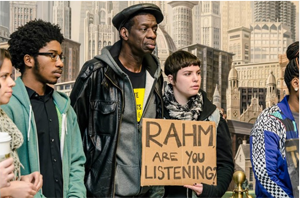Community Reparations
A guest post by Liz Diligio, a 2nd year student in the Community Psychology, Liberation Psychology, and Ecopsychology Specialization of the M.A./Ph.D. Depth Psychology Program (C.L.E. program)
In May of 1972 Jon Burge, a Vietnam veteran, was promoted to police detective on Chicago’s south side. For the next twenty years Burge and other officers used torture techniques Burge learned in Vietnam to force confessions from men arrested in the neighborhood. Jon Burge eventually sent over 200 hundred men to prison based on confessions obtained through torture. The practice finally came to light during proceedings before the Police Board in 1992, when City lawyers admitted that the evidence of Area 2 (Burge’s district) use of torture established "an astounding pattern or plan… to torture certain suspects… into confessing to crimes.”
 Justice for Jon Burge's Victims
Justice for Jon Burge's Victims
This hearing came about from the activism of local grass roots movements and today more than twenty years later groups are still fighting for justice. The Chicago Torture Justice Memorial group has proposed to the Chicago’s City council a unique proposal that would fund a community center in the neighborhoods most affected by Jon Burge. The community center would provide counseling, vocational training, cultural projects and ensure the history of Jon Burge/Area 2 is taught in Chicago high schools. The proposal holistically posits the community as victims alongside the men who were tortured. The community center is part of a larger reparations proposal that intentionally links healing with justice by also calling for the release of all men still incarcerated from false confessions.
Reparations are often seen in the limited terms of money. The proposal in Chicago creates the potential for the genuine transformation of a radically cruel wound. Wounds from torture will not heal without acknowledging the reality that one of the purposes of torture is to terrorize the community. The proposal erases the illusion that the crime of torture is between the victim and the perpetrator. Instead upholding a stance that honors the vital inter-connections between victim and community with a broad understanding of impact. Psychologists from the Kovler Center, a center for survivors of torture, helped to draft the bill based on the experience of survivors. I have been working with this group to help pass the reparations bill. It is an opportunity for me to place what I am learning in C.L.E. into spaces of grass roots organizing. C.L.E. is helping me to co-create spaces of healing and justice.

* This article first appeared in Volume 3 of Hearing Voices, spring 2015.
The Hearing Voices Annual Newsletter from Pacifica's Community Psychology, Liberation Psychology, and Ecopsychology (C.L.E.) Specialization of the M.A./Ph.D. Depth Psychology Program showcases the work of students in the program who are committed to rebuilding fragmented cultural and ecological connections, and to co-creating democratic, dialogical, joyful, sustainable, and nonviolent living.
We invite you to explore the other organizations and communities students in the C.L.E. Specialization are working with to in an effort to, what Paolo Freire desires to create, which is "a world in which it will be easier to love."



